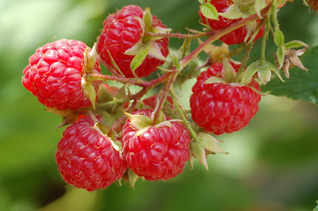
Raspberries
Raspberries > Raspberry Varieties • Raspberries Photo

What Are Raspberries?
Raspberries are a composite fruit traditionally available in mid-summer, but with new harvesting innovations they can be enjoyed all year long. Raspberries are red in color, and boast a distinctive flavor that is both sweet and tart. Commercially available types of raspberries include summer-bearing plants, which produce fruit in summer, and ever-bearing plants, which produce fruit in the fall as well as summer. Raspberry plants belong to the genus Rubus, and they are widely available from wholesale and retail plant nurseries and growers.
Growing Raspberries
Raspberry plants often grow in fields or forest clearings and are very hardy, having a tendency to take over unless cut back. Plants are usually started in the winter by planting dormant canes 3 feet apart. The first year after planting, all the flowers should be removed to allow the plant to build up reserves. From the second year on, the plants will flower in the spring and the raspberries will ripen in the summer. Raspberry plants need adequate water and fertilizer in the spring and summer, but quantities should be decreased in autumn to harden the canes for winter. In the winter the old flowered canes should be pruned to ground level. Fruit is ripe and ready for picking when it has turned a deep red and falls off the stem easily when touched.
Raspberry Uses
Raspberry plants have many uses and benefits. The leaves, which are found in groups of three or five, have silver-white undersides and can be used fresh or dried in herbal teas. It is believed that raspberry leaves can be helpful for a sore throat, as well as various stomach ailments, and a tea made with raspberry leaves has been used throughout history to encourage speedy childbirth. Xylitol, an alternative sweetener made from sugar alcohol, is extracted from raspberries. Raspberries also contain polyphenol antioxidants which promote cardiovascular health. Finally, raspberries are excellent in jams, pies, as dessert toppings, or simply by themselves!
Raspberry Information Resources
- Blackberries and Raspberries (PDF)
Taxonomy, cultivars, origin, history, folklore, medicinal properties, production stats, food and non-food uses, and more. - Brambles - Production, Management, and Marketing
Ohio State University bulletin about managing and marketing blackberries and raspberries. - Berries
Cornell University's fruit website features extensive information about berry production, pest management, and marketing. - University of Illinois Extension - Raspberries & More
General information, nutrition facts, planting, care, pruning, insects, and diseases. - Backyard Gardener - Growing Raspberries
Introduction to backyard raspberry cultivation. Topics include preparing and feeding the bed, planting, and pruning. - Organic Culture of Bramble Fruits
Publication about the production of organic raspberries and blackberries. - Crop Profile for Red Raspberries in Washington
Extensive guide to red raspberries in Washington State.
Berry Organizations
- North American Bramble Growers Association
This association of blackberry and raspberry growers and agricultural professionals offers information about bramble fruits for growers and researchers, as well as for consumers, the media, and kids. - Red Raspberries
The National Processed Raspberry Council invests in research on the health and wellness benefits of raspberry consumption and communicates the advantages of raspberries to consumers, food manufacturers and foodservice decision makers in order to build demand and secure the long-term viability of the industry. - Oregon Raspberry & Blackberry Commission
The Oregon Raspberry & Blackberry Commission focuses on promoting caneberries to multiple audiences, and supports Oregon berry farmers by fostering plant research and farming education initiatives. - New York State Berry Growers Association
Founded in 1988, the New York State Berry Growers Association (NYSBGA) is a nonprofit educational association for berry growers, from large wholesale family farms to independent farm stands and pick-your-own operations, across New York State. - Wisconsin Berry Growers Association
The Wisconsin Berry Growers Association is a non-profit organization dedicated to the production and promotion of Wisconsin strawberries, raspberries, and blueberries. - Washington Red Raspberry Commission
The Washington Red Raspberry Commission (WRRC) was formed in 1976 to support and promote the raspberry industry. Their growers and processors are spread throughout southern Canada, western Washington State, and northern Oregon.
Copyright © 2005-2026 Raspberries.us.
All rights reserved. About us.
All rights reserved. About us.